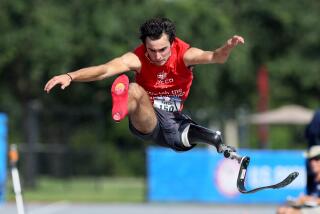THE SEOUL GAMES / DAY 13 : Men’s 400 Meters : Steve Lewis Gains Win Over Reynolds
- Share via
SEOUL — Displaying skill beyond his 19 years, Steve Lewis, a UCLA sophomore, outleaned the more experienced world record-holder, Butch Reynolds, at the finish line Wednesday in the Olympic Stadium to become the 400-meter champion and the second-most famous Lewis of the Games.
He won in 43.87 seconds, the third-fastest time ever and only one one-hundreth of a second behind the 20-year-old Olympic record of 43.86 set by the United States’ Lee Evans in Mexico City.
That also was the world record, second-oldest in the books behind Bob Beamon’s 29-foot 2 1/2-inch long jump in those same Games, until last month, when Reynolds, from Akron, Ohio, ran 43.29 in Zurich, Switzerland.
After 1987 world champion Thomas Schoenlebe of East Germany failed to advance beyond the semifinals, Reynolds, 24, was easily the favorite in the final. But he ran a less than brilliant tactical race and couldn’t overtake Lewis at the tape, finishing in 43.93.
There was no reason for embarrassment. That is the fourth-fastest 400 of all time.
UCLA also won the bronze medal as senior Danny Everett, 21, ran 44.09. It was only the third time in Olympic history that the 400 medals have been swept by one country. The United States also did it in 1904 and 1968.
Although it was apparent to the near-capacity crowd in the 70,000-seat Olympic Stadium, Lewis didn’t know that he had held off Reynolds’ late surge until after watching the replay on the giant scoreboard.
“I don’t know, I don’t know,” Lewis said, watching the screen as Reynolds struggled to catch him and Everett, who were leading coming off the final curve.
“Here comes Butch, here comes Butch, here comes Butch,” said Lewis’ coach, UCLA assistant coach John Smith, who was standing next to the man he and Bruin Coach Bob Larsen recruited a little more than a year ago out of Fremont’s American High School in the San Francisco Bay Area.
As Reynolds passed Everett and began to set his sights on Lewis, Smith said, “Let’s see, let’s see, let’s see.”
Lewis’ perfect lean made the difference.
Smith picked him up and spun him around in his arms.
“I’m flabbergasted,” Smith said later. “He’ll be one of the great quarter-milers of all time.”
He may already be, although hardly anyone thought he would finish ahead of Reynolds Wednesday. In the semifinals of the U.S. Olympic trials in July, Lewis ran 44.11, a career best at the time, but he was overwhelmed by the pressure in the final and finished third behind Reynolds and Everett, who is from Fairfax High School.
It didn’t seem likely that Lewis, who won’t turn 20 until May, would mature enough in two months to cope with the Olympics.
But as he has been doing all year, he proved everyone wrong about him. Earlier this year, his UCLA teammates laughed at him when he said he thought he could break the world junior record of 44.69. He did that for the first time in the Pacific 10 championships in May and has broken his own junior record four times since.
“The reason I beat Butch and Danny today is because I wanted it a lot more,” Lewis said. “I was the underdog. People doubted me. They put limits on my age. There are no limits to running.”
Reynolds, who likes to wait until he comes off the final curve to unleash his fearsome kick, waited too long this time. Believing he could run down Lewis and Everett in the stretch, he ran the first half of his race too slow.
“I did lose at the start,” Reynolds said. “Coming home, I thought I had a lot left. I needed 2 more meters.”
Lewis was glad that Reynolds didn’t have it.
“When I realized I was strong enough to come home, it was just a matter of holding on,” he said. “I was able to hold on all the way, just a race to the tape.”
Smith said that he believes all three runners are capable of running under 43.50 and that Lewis might eventually break 43 seconds. Considering their youth, it should make for interesting competition among the three over the next few years.
“Steve responded best today,” Smith said. “Someone else might the next time.”
More to Read
Go beyond the scoreboard
Get the latest on L.A.'s teams in the daily Sports Report newsletter.
You may occasionally receive promotional content from the Los Angeles Times.





